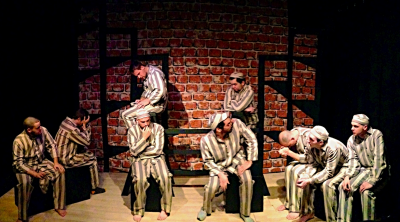
It was already maybe the smallest stage I’ve ever seen, and much of it was taken up by black spray painted stepladders with boards between them and black theater blocks; the wall behind it painted to look like a brick wall with shadows of barracks on the sides. The woman seated next to me remarked that it looked like a stand-up stage, but most stand-up stages I’ve seen looked bigger.
As the lights go up, 9 men in concentration camp garb fill it. Then sit and slouch. And sit. And slouch. Twenty seconds, if not more, go by, and they’re still just sitting there, looking dead. Finally, after maybe 30 seconds that feel like 5 minutes, one of them speaks. About waiting. Eventually, one of the two speaking men angrily announces that it’s time for them to once again rehearse his comedy about the Dreyfus affair, and that’s when things start to get weird.
And so begins Muse of Fire, by Jake Rosenberg, a freshman dramatic writing student at NYU’s Tisch School of the Arts. At 19, Rosenberg is already an accomplished playwright—he began writing plays at 16, and has won or placed in numerous national competitions and has had his plays performed all over the world. Muse of Fire actually began life as his senior project for The Jewish Community High School of the Bay in San Francisco, though according to the program, the version I saw at the Manhattan Repertory Theater on November 2 represents its growth far beyond its “academic birth,” and it shows, for the most part.
The play centers around the obsession of one Auschwitz inmate, Georg, an actor in his previous life, to make his barracks mates act out his comedy about the Dreyfus Affair. “Here in Auschwitz, we have the freest theater in the world,” he says, free of intimidation or censorship. After all, what will they do, arrest him?
His barracks mates treat him and his project with everything from scorn, to hostility, to passive resistance, but the force of Georg’s personality is such that they can’t but go along with him. And his play is…as funny as it can be. Watching an (intentionally) middle-grade farce of French history and turn-of-the-last-century anti-Semitism, complete with Monty Python-caliber French accents put on by Auschwitz prisoners is one of the most surreal things I’ve ever seen on stage. Coming from the mouths of Auschwitz prisoners, the anti-Semitic jokes of the era feel that much more pathetic, and, at various points, the men themselves even stop to protest them. But Georg forces the play to go on.
In the end (and especially in its end), Muse of Fire is a profound meditation on the nature, purpose, and function of the human impulses towards scapegoating, escapism, and comedy—the genre itself as much as the mentality of those who write it—that constantly fluctuates between levels of meta-drama.
Rosenberg writes in the program that he believes the time has come to go beyond straightforward narratives of the Holocaust, that, as he puts it, “‘Never Forget…should not be synonymous with ‘Never Change.’” This play is about as “accurate” a portrayal of the Holocaust as Georg’s play is of the Dreyfus affair, and that’s as it should be. Unlike Barry Levey in Hoaxocaust!, Rosenberg’s focus here isn’t fighting denialism, but literalism, the idea that the severity of the Holocaust and the struggle against trivializing or denying it means that we can’t develop new stories around it, that it’s too sacred to ever be a setting for fantasy or farce. As Rosenberg puts it, “We must tell new stories. Otherwise, ‘Never Forget’ becomes not an instrument of our liberation, but another cage.”
In Muse of Fire, Rosenberg takes his prisoners out of that cage and makes his audience come along with them. It’s not always pretty, and it’s not always easy, but by the end, neither they nor we can deny its necessity. Rosenberg, like Georg, deeply understands that time-tested Jewish truth that we are never so free as when we can laugh under even the most dire of circumstances, and his play should leave audiences similarly inspired to laugh in the face of life’s absurdities.
Those in New York can still catch the work of this gifted young playwright. Muse of Fire will run November 7 and 8 at 9 PM at the Manhattan Repertory Theatre, 303 W. 42 St, 6th floor, NYC.
Derek M. Kwait graduated from the University of Pittsburgh and is editor in chief of New Voices.

